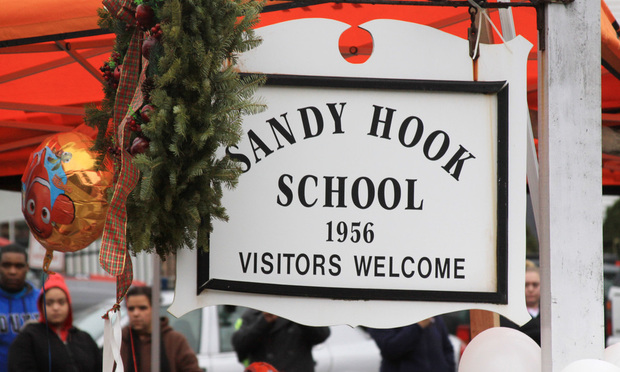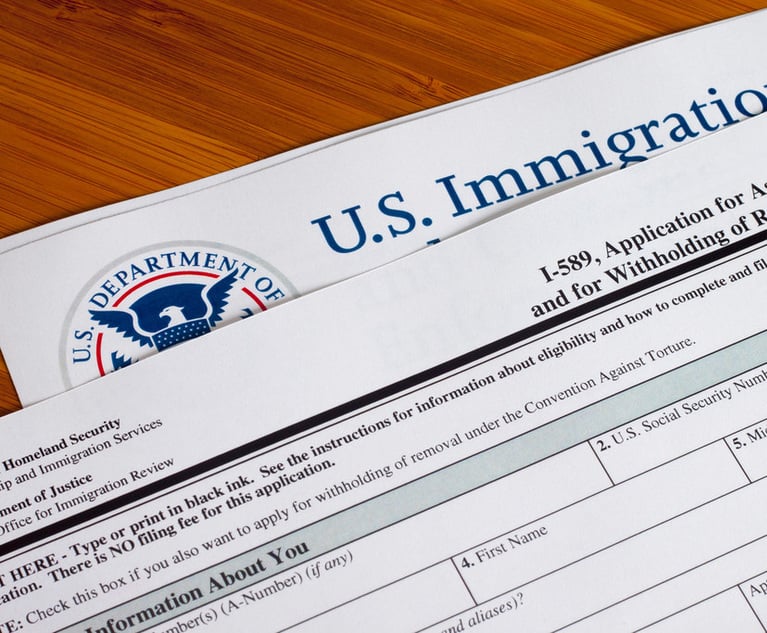Appellate Court Set to Hear Arguments in School Protocol Lawsuit After Sandy Hook Shooting
The Appellate Court will hear oral arguments Wednesday afternoon from attorneys for two Sandy Hook families and attorneys from the town and school board, related to proper protocols during the time the elementary school was under attack by a mass shooter.
April 15, 2019 at 06:05 PM
4 minute read
 Sandy Hook Elementary School. Photo: Ron Franks/Shutterstock.com
Sandy Hook Elementary School. Photo: Ron Franks/Shutterstock.com
The attorney for two families of children killed in the December 2012 Sandy Hook Elementary School massacre expressed optimism Monday that the Connecticut Appellate Court will look closely at the exceptions to governmental immunity, and overrule a Superior Court judge who last year found the city and school board weren't negligent in the deaths.
Donald Papcsy, attorney for the families of Jesse Lewis and Noah Pozner, told the Connecticut Law Tribune that he believes the exceptions for governmental immunity were met when Adam Lanza shot and killed 20 schoolchildren and six educators.
Assisting Papcsy is his colleague Devin Janosov.
The Connecticut Appellate Court in Hartford will hear oral arguments Wednesday afternoon.
Superior Court Judge Robin Wilson focused her May 2018 decision primarily on governmental immunity, which she found granted the town broad discretion.
Papcsy, a partner with Papcsy Janosov Roche Trial Lawyers, believes the judge focused her ruling on when the killings took place, as opposed to when the shooting began.
“The problem with the judge's decision, in our opinion, is that she jumped forward and said they were under attack immediately, and that school officials had to make a [split-second] decision,” Papcsy said Monday. “But, there is a span of time when it's just gun fire that is heard and apparent before people are actually being shot.”
Papcsy said top school officials knew there was a protocol to lock down the school, thus locking all doors to all classrooms. But no lock down was ever called during the incident, he said.
“A jury should be able to decide whether or not the most reasonable thing to do in that circumstance was to run out into the hallway,” Papcsy said. The attorney said what school security, the principal and vice principal trained for was to press the intercom button and call for a code blue. “That would have allowed for all the teachers to be put on alert and to go into immediate lockdown,” Papcsy said. In addition to the staff allegedly lacking the proper training for a lockdown, the plaintiffs also allege school officials failed to provide doors that could lock from the inside.
“The purpose of a lockdown is to provide time for the police to show up on the scene and do what they are trained to do,” said Papcsy, who believes the exceptions of governmental immunity related to an imminent threat and identifiable victims were clearly met.
Representing the city and school board are attorney Charles Deluca, a senior partner with Stamford's Ryan Ryan Deluca, and Monte Frank, a member of Pullman & Comley.
Frank did not respond to a request for comment, but Deluca told the Connecticut Law Tribune Monday, “I don't have any comment other than to say I think that she [the judge] made a very well-reasoned decision, and we are hopeful the appellate court will agree.”
Meanwhile, as far as damages for the families, Papcsy said, “We want a jury to hear the case. We want the people of our community to decide the consequences for not keeping our children safe.”
In a related case, the Connecticut Supreme Court last month reinstated a wrongful death lawsuit filed on behalf of nine families against Remington Arms, the manufacturer of the AR-15 rifle used in the massacre. The gun makers have since asked for a stay of any litigation pending their request that the U.S. Supreme Court hear the matter.
Read More:
This content has been archived. It is available through our partners, LexisNexis® and Bloomberg Law.
To view this content, please continue to their sites.
Not a Lexis Subscriber?
Subscribe Now
Not a Bloomberg Law Subscriber?
Subscribe Now
NOT FOR REPRINT
© 2025 ALM Global, LLC, All Rights Reserved. Request academic re-use from www.copyright.com. All other uses, submit a request to [email protected]. For more information visit Asset & Logo Licensing.
You Might Like
View All
Trump Administration Faces Legal Challenge Over EO Impacting Federal Workers
3 minute read
Settlement Allows Spouses of U.S. Citizens to Reopen Removal Proceedings
4 minute read
Trending Stories
Who Got The Work
J. Brugh Lower of Gibbons has entered an appearance for industrial equipment supplier Devco Corporation in a pending trademark infringement lawsuit. The suit, accusing the defendant of selling knock-off Graco products, was filed Dec. 18 in New Jersey District Court by Rivkin Radler on behalf of Graco Inc. and Graco Minnesota. The case, assigned to U.S. District Judge Zahid N. Quraishi, is 3:24-cv-11294, Graco Inc. et al v. Devco Corporation.
Who Got The Work
Rebecca Maller-Stein and Kent A. Yalowitz of Arnold & Porter Kaye Scholer have entered their appearances for Hanaco Venture Capital and its executives, Lior Prosor and David Frankel, in a pending securities lawsuit. The action, filed on Dec. 24 in New York Southern District Court by Zell, Aron & Co. on behalf of Goldeneye Advisors, accuses the defendants of negligently and fraudulently managing the plaintiff's $1 million investment. The case, assigned to U.S. District Judge Vernon S. Broderick, is 1:24-cv-09918, Goldeneye Advisors, LLC v. Hanaco Venture Capital, Ltd. et al.
Who Got The Work
Attorneys from A&O Shearman has stepped in as defense counsel for Toronto-Dominion Bank and other defendants in a pending securities class action. The suit, filed Dec. 11 in New York Southern District Court by Bleichmar Fonti & Auld, accuses the defendants of concealing the bank's 'pervasive' deficiencies in regards to its compliance with the Bank Secrecy Act and the quality of its anti-money laundering controls. The case, assigned to U.S. District Judge Arun Subramanian, is 1:24-cv-09445, Gonzalez v. The Toronto-Dominion Bank et al.
Who Got The Work
Crown Castle International, a Pennsylvania company providing shared communications infrastructure, has turned to Luke D. Wolf of Gordon Rees Scully Mansukhani to fend off a pending breach-of-contract lawsuit. The court action, filed Nov. 25 in Michigan Eastern District Court by Hooper Hathaway PC on behalf of The Town Residences LLC, accuses Crown Castle of failing to transfer approximately $30,000 in utility payments from T-Mobile in breach of a roof-top lease and assignment agreement. The case, assigned to U.S. District Judge Susan K. Declercq, is 2:24-cv-13131, The Town Residences LLC v. T-Mobile US, Inc. et al.
Who Got The Work
Wilfred P. Coronato and Daniel M. Schwartz of McCarter & English have stepped in as defense counsel to Electrolux Home Products Inc. in a pending product liability lawsuit. The court action, filed Nov. 26 in New York Eastern District Court by Poulos Lopiccolo PC and Nagel Rice LLP on behalf of David Stern, alleges that the defendant's refrigerators’ drawers and shelving repeatedly break and fall apart within months after purchase. The case, assigned to U.S. District Judge Joan M. Azrack, is 2:24-cv-08204, Stern v. Electrolux Home Products, Inc.
Featured Firms
Law Offices of Gary Martin Hays & Associates, P.C.
(470) 294-1674
Law Offices of Mark E. Salomone
(857) 444-6468
Smith & Hassler
(713) 739-1250











